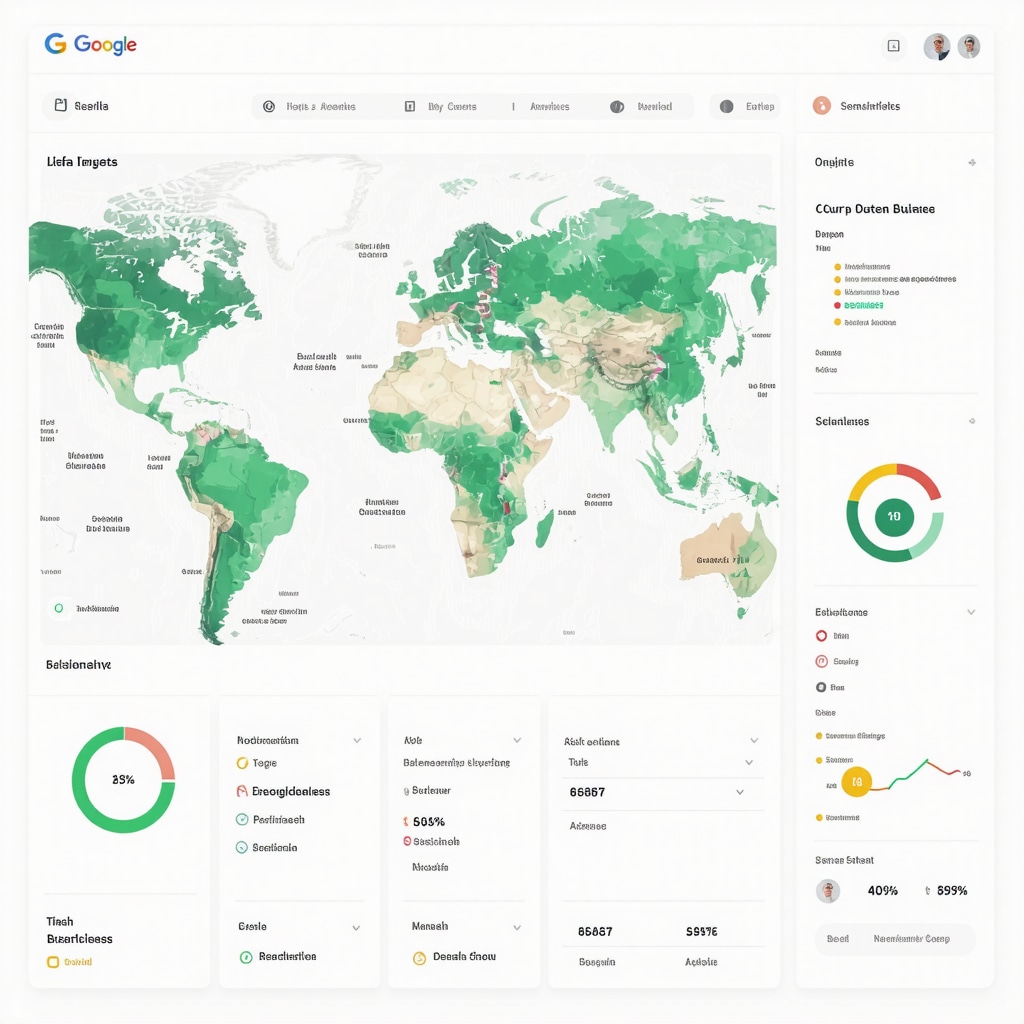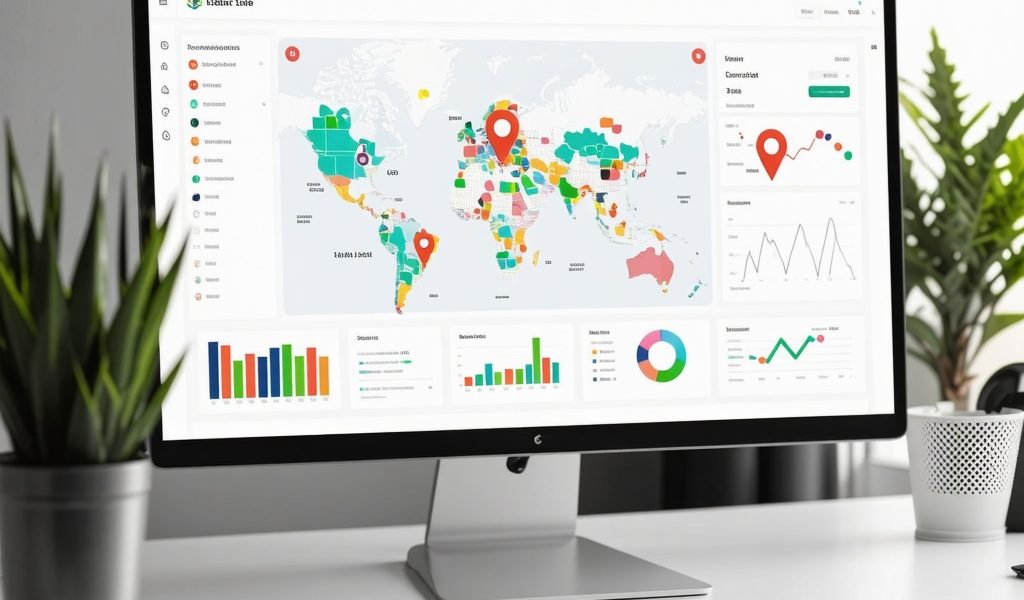Why Google Keyword Planner Is Your Best Friend for Google My Business Success
Imagine this: You’ve set up your Google My Business (GMB) listing, but the traffic trickling in is more like a leaky faucet than a roaring river. You’re wondering, “Where are all the customers?” Here’s the plot twist—Google Keyword Planner, often overlooked outside the SEO world, is the golden key to unlocking massive traffic and leads for your local business via GMB.
As someone who’s navigated the labyrinths of SEO and local search, I can tell you that integrating Google Keyword Planner insights directly into your GMB strategy isn’t just smart; it’s essential. This tool reveals what your potential customers are typing into Google right when they’re ready to buy, dine, or inquire. And that, dear readers, is pure marketing gold.
How Does Keyword Research Breathe Life Into Your GMB Listing?
Keywords are the language your customers speak when searching online. By using Google Keyword Planner, you discover which terms resonate locally. Are folks in your neighborhood searching for “best vegan bakery near me” or just “vegan cupcakes”? Knowing this distinction allows you to tailor your GMB profile and posts with precision, boosting your local visibility and snagging traffic that’s ripe for conversion.
Can a Keyword Planner Really Make Your GMB Listing Irresistible?
Absolutely. Think of it this way: without knowing the right keywords, your GMB is like a billboard in the desert—nobody’s around to see it. But with targeted keyword data? Your listing becomes a neon sign on Main Street, attracting curious eyes and eager wallets. Strategic keyword insertion in your business description, services, and updates can elevate you to the coveted Google 3-Pack, increasing both clicks and calls.
Don’t just take my word for it. According to Moz’s local SEO guide, keyword optimization on local listings plays a crucial role in search rankings, reinforcing the power of semantic SEO and customer-centric content.
Getting Tactical: Your First Steps With Google Keyword Planner for GMB
Start by diving into Google Keyword Planner to identify high-volume, low-competition local search terms. Next, weave these gems naturally into your GMB title, description, and posts. Remember, authenticity matters—avoid keyword stuffing like the plague. Your goal? To speak your customer’s language with clarity and charm.
Curious about mastering this synergy? Explore the step-by-step guide to Google Keyword Planner for winning GMB SEO strategies for a deep dive into techniques that marry keyword research with local SEO finesse.
Feeling inspired or have a success story about using keyword planning for your Google Business profile? Share your thoughts below or join the conversation to swap tips and tricks with fellow local business warriors.
Exploring Semantic Depth: How Long-Tail Keywords Transform Your GMB Presence
While broad terms might get you started, it’s the long-tail keywords that act as precision instruments in your Google My Business optimization toolkit. These phrases, often longer and more specific, capture the nuanced search intent of local customers. For example, instead of targeting just “coffee shop,” incorporating keywords like “organic single-origin coffee shop downtown” can hone in on a highly motivated, niche audience.
Such specificity not only reduces competition but also enhances relevance, which Google rewards with better ranking signals. Carefully analyzing these long-tail queries through Google Keyword Planner allows you to tailor your GMB content with laser focus, ensuring your listing resonates deeply with those ready to convert.
Integrating Customer Intent: Beyond Keywords to Meaningful Engagement
Keyword data is more than just a list—it’s a window into customer behavior and mindset. When you align your GMB posts, Q&A, and services with the genuine needs and questions revealed by keyword research, your business becomes a trusted local authority. This alignment fosters engagement, increases click-through rates, and drives conversions.
Consider this: Google’s algorithms increasingly prioritize user experience signals, including how well your listing satisfies searcher intent. Incorporating insights from Google’s Local RankBrain update into your GMB strategy ensures you’re not only visible but also genuinely helpful to prospective customers.
How Can Smart Keyword Research Elevate Your GMB to Local Market Leadership?
The answer lies in strategic foresight combined with tactical execution. By continuously monitoring keyword trends in your locale and adapting your GMB content accordingly, you position your business as the go-to solution. This dynamic approach keeps you ahead of competitors who rely on static or generic optimization tactics.
Practical steps include regular keyword re-assessment, integrating trending local search terms into your business description, and updating posts to reflect seasonal or event-driven keywords. This agility converts your GMB listing from a passive directory entry into an active lead-generation engine.
For those eager to dive deeper into these advanced strategies, the expert GMB ranking techniques to capture more local leads offer a comprehensive roadmap.
Engage with us! Have you experimented with long-tail keywords or adapted your GMB content based on evolving local search trends? Leave a comment below to share your experiences or questions, and let’s elevate our local SEO game together.
Unlocking Latent Potential: Leveraging Latent Semantic Indexing (LSI) Keywords in Your GMB Strategy
Beyond traditional keywords, Latent Semantic Indexing (LSI) keywords serve as the unsung heroes of sophisticated local SEO. These are terms and phrases semantically related to your primary keywords and help Google understand the depth and context of your business offerings. For instance, if you own a “vintage bicycle shop,” LSI keywords might include “retro bike parts,” “classic cycling gear,” or “restoration services.” Integrating these into your GMB posts and Q&A sections enriches your content’s topical relevance and signals comprehensive expertise to search engines.
Why is this important? Google’s algorithms prioritize context over sheer keyword density, rewarding listings that demonstrate topical breadth and relevance. Employing Google Keyword Planner alongside tools like SEMrush’s semantic keyword tool allows you to uncover LSI keywords tailored to your niche, enabling a layered content approach that appeals simultaneously to Google’s AI and discerning local customers.
How Can LSI Keywords Mitigate Ranking Volatility in Competitive Local Markets?
When local search landscapes become saturated, relying solely on exact-match keywords leaves your GMB listing vulnerable to algorithm fluctuations and competitor advances. Incorporating LSI keywords acts as a stabilizer. By creating semantic networks within your GMB content, you diversify your keyword portfolio, reducing dependency on any single term and improving resilience against ranking dips.
Practically, this means weaving LSI keywords naturally into your business description, services, and even customer reviews. Encouraging clients to mention related terms in their feedback can significantly boost semantic depth. This approach aligns with findings from Search Engine Journal’s in-depth LSI analysis, which highlights how semantic relevance enhances local ranking signals.
Capitalizing on Customer Micro-Moments: Crafting GMB Content That Answers Implicit Queries
Micro-moments represent those fleeting instances when customers reflexively turn to their devices seeking immediate answers or solutions. These moments—categorized as “I-want-to-know,” “I-want-to-go,” “I-want-to-do,” and “I-want-to-buy”—are critical opportunities to align your GMB content with precise intent-driven keywords.
For example, a plumbing service could target micro-moment queries with GMB posts answering “How to fix a leaking faucet quickly?” or “Emergency plumber near me open now.” By incorporating these intent-rich phrases discovered via Google Keyword Planner’s “Questions” filter, your GMB profile transcends static information and becomes a responsive problem solver, amplifying engagement and conversions.
This micro-moment strategy is supported by Google’s own research from Think with Google, emphasizing that brands capturing these moments effectively are more likely to win customers.
How Do You Identify and Prioritize Micro-Moment Keywords for Your Local Business?
Identification starts with analyzing search queries that reflect urgent or highly specific intent. Use Google Keyword Planner to filter keywords by question formats, urgency indicators (like “near me,” “now,” “emergency”), and transactional modifiers. Prioritize those with a balance of meaningful search volume and clear intent alignment with your services.
Once identified, craft GMB posts, FAQs, and service descriptions that directly address these micro-moment needs. This proactive content curation not only improves your visibility but signals to Google that your business is ready and willing to meet immediate customer demands.
Harnessing Reviews as Semantic Powerhouses: Integrating Keyword Insights into Customer Feedback Loops
Customer reviews are more than testimonials—they’re dynamic content goldmines that can amplify your GMB listing’s semantic richness. Encouraging customers to mention specific services, locations, or product features discovered via keyword research can organically embed valuable phrases that search engines recognize.
Consider implementing follow-up emails or in-person prompts that subtly guide customers to include relevant keywords in their reviews. For example, a dental clinic might ask patients to describe their experience with “painless teeth whitening” or “emergency dental care downtown.” This strategy not only enhances your keyword diversity but also builds authenticity and trust.
Moreover, monitoring and responding to reviews with keyword-optimized replies further reinforces your topical authority and engagement signals, critical factors highlighted in BrightLocal’s research on reviews and SEO.
Embracing Natural Language Processing: The Next Frontier in GMB Keyword Optimization
In the evolving landscape of local SEO, harnessing Natural Language Processing (NLP) can turbocharge your Google My Business (GMB) strategy. NLP enables search engines to interpret the contextual meaning behind queries rather than just matching keywords literally. By leveraging semantic analysis tools and Google Keyword Planner’s phrase match and question filters, savvy local businesses can align their GMB content with conversational, intent-rich language that mirrors how customers naturally inquire.
Integrating NLP insights means crafting GMB posts and FAQs with fluid, human-like phrasing that anticipates user questions. This not only enhances user experience but also optimizes for Google’s increasingly sophisticated AI-driven algorithms, which prioritize relevance and helpfulness over keyword stuffing.
How Can AI-Powered Keyword Analysis Amplify Your GMB’s Local Search Authority?
AI-driven tools, when paired with Google Keyword Planner, can identify emerging local search trends and semantic patterns that traditional keyword research might miss. For example, machine learning models analyze vast data sets to uncover latent connections between related terms, synonyms, and customer sentiments. This depth of insight helps businesses fine-tune their GMB profiles with dynamic, contextually relevant content that resonates with both search engines and local audiences.
By adopting an AI-augmented approach, you can strategically refresh your GMB listing to reflect seasonal nuances, event-driven keywords, and shifting consumer language, maintaining a competitive edge in your local market. For those interested in a comprehensive roadmap, advanced GMB ranking techniques offer valuable strategies for leveraging AI insights effectively.
Beyond Keywords: Crafting Emotionally Resonant GMB Content to Capture Local Hearts
While keyword precision is crucial, connecting emotionally with your audience can transform casual searchers into loyal customers. Understanding the emotional triggers and values embedded in local search queries allows you to infuse your GMB business description, posts, and responses with empathy and authenticity.
For instance, incorporating phrases that emphasize community support, sustainability, or personalized service can align your brand with local values, enhancing trust and engagement. This subtle yet powerful strategy complements your keyword optimization efforts and boosts click-through and conversion rates.
Can Emotional SEO Tactics Harmonize with Google’s Algorithmic Expectations Without Compromising Ranking?
Absolutely. Google’s evolving algorithms reward content that satisfies user intent holistically, blending semantic relevance with positive user experience signals. By integrating emotional cues naturally within keyword-rich content, businesses can achieve a dual benefit: improved rankings and deeper customer connection.
Research from Search Engine Journal underscores that emotional resonance in content correlates with increased dwell time and lower bounce rates—both critical ranking factors.
Expanding Your GMB Ecosystem: Leveraging Structured Data and Schema Markup for Enhanced Visibility
To further amplify your Google Business Profile’s reach, integrating structured data and schema markup on your website complements your GMB keyword strategy. Schema enriches your listing by providing Google with explicit context about your business, products, services, and reviews, enabling enhanced features like rich snippets and knowledge panels.
Combining schema with keyword insights from Google Keyword Planner ensures that your local SEO ecosystem speaks a consistent, authoritative language both on your GMB and your website, maximizing visibility in competitive local markets.
For a detailed walkthrough of these techniques, check out our guide on comprehensive local SEO optimization techniques, where schema integration is dissected alongside advanced keyword tactics.
Inviting the Community: Share Your Expertise and Elevate Local SEO Together
Have you experimented with NLP, AI-driven keyword tools, or emotional SEO strategies to elevate your Google My Business profile? Your insights could illuminate the path for fellow local entrepreneurs navigating this intricate landscape.
Join the conversation by sharing your experiences or questions below. Let’s build a vibrant community of local SEO experts committed to mastering the ever-evolving nuances of Google Business optimization.

Expert Insights & Advanced Considerations
Semantic Richness as a Competitive Moat
Incorporating Latent Semantic Indexing (LSI) keywords into your Google My Business (GMB) profile transcends basic keyword stuffing. This semantic layering creates a topical network that signals depth and authority to Google’s algorithms, making your listing more resilient to ranking fluctuations. Thoughtful integration of LSI terms, discovered via Google Keyword Planner and complementary semantic tools, elevates your local SEO to a sophisticated level that outperforms competitors relying solely on traditional keyword tactics.
Micro-Moment Targeting: Capturing Intent in Real Time
Local search success hinges on addressing customer micro-moments—the split seconds when users seek immediate answers or services. Leveraging Google Keyword Planner’s question and intent filters to identify these urgent queries enables you to tailor GMB content that meets needs precisely when they arise. This strategy not only boosts visibility but builds trust by positioning your business as a go-to resource during critical decision-making moments.
AI-Augmented Keyword Analysis for Dynamic Optimization
Integrating AI-powered insights with Google Keyword Planner data unlocks emerging trends and nuanced semantic relationships often invisible through manual research. This dynamic approach allows businesses to adapt their GMB profiles in near real-time, reflecting seasonal shifts, local events, and evolving customer language. Employing AI tools in this way future-proofs your Google Business SEO strategy against changing algorithms and market conditions.
Emotional SEO: Bridging Keywords with Human Connection
Optimizing GMB content for emotional resonance complements keyword precision by tapping into local community values and customer sentiments. When your profiles and posts communicate authenticity, empathy, and shared values alongside targeted keywords, engagement and conversion rates climb. This dual-focus approach aligns seamlessly with Google’s evolving algorithmic preference for user-centric, meaningful content.
Structured Data and Schema: The Technical Layer of Visibility
While keyword strategies capture attention, schema markup enriches your listing’s presentation in search results. Properly implemented structured data on your website enhances your GMB’s semantic context, enabling features like rich snippets and knowledge panels that increase click-through rates. Combining this technical SEO layer with keyword insights ensures a comprehensive local SEO ecosystem.
Curated Expert Resources
Moz Local SEO Guide: A definitive resource for understanding the interplay between keyword optimization and local search ranking factors, offering actionable strategies for GMB success.
Search Engine Journal’s LSI Analysis: An in-depth exploration of latent semantic indexing and its impact on local SEO, providing nuanced techniques to diversify your keyword portfolio effectively.
Think with Google – Micro-Moments Research: Groundbreaking insights into consumer behavior during micro-moments, essential for crafting intent-driven GMB content.
BrightLocal Research on Reviews and SEO: Empirical evidence demonstrating how keyword-optimized customer reviews boost local search rankings and enhance trust.
Ranking SEO GMB Advanced Techniques: A comprehensive roadmap to leverage AI, structured data, and semantic keywords for sustained local market leadership, available at Ranking SEO GMB.
Final Expert Perspective
Mastering Google Keyword Planner for Google My Business is far more than a routine SEO task; it’s an evolving craft that demands strategic foresight, semantic sophistication, and empathetic content creation. By weaving LSI keywords, micro-moment intent, AI-driven insights, and emotional resonance into your GMB profile, you position your local business not just to rank—but to lead, engage, and convert in your community. For those ready to elevate their local SEO game, exploring advanced techniques and integrating structured data will unlock untapped potential and secure long-term visibility.
Engage with these ideas, share your professional experiences, and explore the [complete guide to mastering Google Business SEO] to transform your local search presence into a powerhouse of customer attraction and retention.



